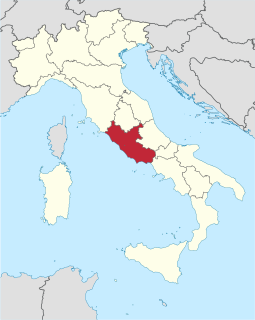Latin is an Italic language, originally spoken in ancient Rome and its empire.
Latina is the feminine form of the term Latino.
The term Latino is a noun and adjective often used in English, Spanish and Portuguese to refer to people in the United States with cultural ties to Latin America, in particular to those countries which are Spanish- or Portuguese-speaking.

Lazio is one of the 20 administrative regions of Italy. Situated in the central peninsular section of the country, it has almost 5.9 million inhabitants – making it the second most populated region of Italy – and its GDP of more than 170 billion euros per annum means that it has the nation's second largest regional economy. The capital of Lazio is Rome, which is also Italy's capital and the country's largest city.

The Orsini family is an Italian noble family that was one of the most influential princely families in medieval Italy and Renaissance Rome. Members of the Orsini family include three popes: Celestine III (1191–1198), Nicholas III (1277–1280), and Benedict XIII (1724–1730). In addition, the family membership includes 34 cardinals, numerous condottieri, and other significant political and religious figures.

Pope Benedict XIII, born Pietro Francesco Orsini and later called Vincenzo Maria Orsini, was head of the Catholic Church and ruler of the Papal States from 29 May 1724 to his death in 1730.
Roman or Romans usually refers to:
The term Lombard refers to members of or things related, directly or indirectly, to Lombardy, a region in northern Italy encompassing in the past all of northern Italy.
Barbarossa, a name meaning "red beard" in Italian, may refer to:

The Latin Union was an international organization of nations that used Romance languages that existed as a functional institution from 1983 to 2012. Its aim was to protect, project, and promote the common cultural heritage of Latin peoples and unifying identities of the Latin, and Latin-influenced, world. It was created in 1954 in Madrid, Spain, and its membership rose from 12 to 36 states, including countries in North America, South America, Europe, Africa, and the Asia-Pacific region.

Citizenship in ancient Rome was a privileged political and legal status afforded to free individuals with respect to laws, property, and governance.
Latin America is generally considered to comprise all of the politically independent territory of the Western Hemisphere outside of Canada and the United States, that was originally colonized by the Spaniards or Portuguese. "Latino" is the umbrella term for people of Latin American descent that in recent years has supplanted the more imprecise and bureaucratic designation "Hispanic". Part of the mystery and difficulty of comprehension lies in the fact that the territory we call Latin America is not homogeneous in natural or in cultural characteristics. Latin American stereotypes have the greatest impact on public perceptions and that Latin Americans were the most negatively rated on several characteristics. Americans' perceptions of the characteristics of Latin American immigrants in particular are strongly linked to their beliefs about the impact of immigration, especially on unemployment, schools and crime.

Latium is the region of central western Italy and the entirety of Vatican City in which the city of Rome was founded and grew to be the capital city of the Roman Empire. Latium was originally a small triangle of fertile, volcanic soil on which resided the tribe of the Latins or Latians. It was located on the left bank of the River Tiber, extending northward to the River Anio and southeastward to the Pomptina Palus as far south as the Circeian promontory. The right bank of the Tiber was occupied by the Etruscan city of Veii, and the other borders were occupied by Italic tribes. Subsequently, Rome defeated Veii and then its Italic neighbours, expanding Latium to the Apennine Mountains in the northeast and to the opposite end of the marsh in the southeast. The modern descendant, the Italian Regione of Lazio, also called Latium in Latin, and occasionally in modern English, is somewhat larger still, though less than twice the size of the original Latium.
Orsini is a surname of Italian origin, ultimately derived from Latin ursinus ("bearlike") and originating as an epithet or sobriquet describing the name-bearer's purported strength. Notable people with the surname include the following:
Latino Orsini was an Italian Cardinal.

Contemporary Latin is the form of the Latin language used since the end of the 19th century. Various kinds of contemporary Latin can be distinguished, including the use of single words in taxonomy, and the fuller ecclesiastical use in the Catholic church - but Living or Spoken Latin is the primary subject of this article.

Latino Malabranca Orsini was a Roman noble, an Italian cardinal of the Holy Roman Church, and nephew of Pope Nicholas III.
The ethnonyms Hispanic and Latino are used to refer collectively to the inhabitants of the United States who are of Latin American or Spanish origin. The usage of both terms has changed to adapt to a wide range of geographical and historical influences. The term "Hispanic" was used first; later, some Hispanics in the western United States came to prefer the term "Latino". The Census does not classify persons of Portuguese or Brazilian descent as Hispanic, as those are Portuguese-speaking populations. According to a 2011 study by the Pew Research Center, the majority (51%) of Hispanic and Latino Americans prefer to identify with their families' country of origin, while only 24% prefer the terms "Hispanic" or "Latino".

Claudia Alejandra Menkarski, known as Claudia Brant, is an Argentine composer, producer and singer in diverse genres and multiple languages.
This page is based on this
Wikipedia article Text is available under the
CC BY-SA 4.0 license; additional terms may apply.
Images, videos and audio are available under their respective licenses.








